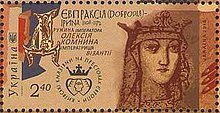| Dobrodeia of Kiev | |
|---|---|
| Basilissa | |
 Dobrodeia-Eupraxia on a 2016 Ukrainian stamp | |
| Empress of the Byzantine Empire | |
| Tenure | c. 1122–1131 |
| Born | c. 1108 Kiev, Kievan Rus' |
| Died | 16 November 1131 |
| Spouse | Alexios Komnenos |
| House | Monomakhovichi |
| Father | Mstislav I of Kiev |
| Mother | Christina Ingesdotter of Sweden |
Dobrodeia Mstislavna of Kiev (Cyrillic: Добродея Мстиславна; baptized Eupraxia [Εὐπραξία] or Irene [Εἰρήνη]; died 16 November 1131) was a Byzantine empress by marriage to co-emperor Alexios Komnenos. She was also an author on medicine.[1]
Life
[edit]Born in Kiev in the early years of the 12th century, Dobrodeia was the daughter of Mstislav I of Kiev and Christina Ingesdotter of Sweden.[2] In or shortly after 1122, she married Alexios Komnenos, the eldest son and co-emperor of Byzantine emperor John II Komnenos (r. 1118–1143). She received the title of empress (basilissa), and the Christian name "Irene", after her mother-in-law, Empress Irene of Hungary (other sources give her Christian name as "Eupraxia").[3] She and Alexios had one daughter, Maria, who was born c. 1125.[4]
In the imperial court of Constantinople, she became a part of a circle of women intellectuals, notably Alexios' aunt Anna Comnena, and the noblewoman Irene, known as a patron of astrologers and scholars.[2] She was encouraged to find her own scholarly interest, studied extensively and was described by contemporaries: "She was not born in Athens, but she learned all the wisdom of the Greeks".[2] The writer Theodore Balsamon noted that she "displayed a fascination with healing methods" and that she formulated medical salves and described their efficiency in a treatise on entitled "Ointments" (Greek "Alimma"), which is regarded as the first treatise on medicine written by a woman. Fragments of this work are kept in the Medici Library in Florence.[2] She studied the ancient physician Galen, and translated some of his works into Old East Slavic.[2][failed verification]
She died, of unknown causes, on 16 November 1131.[4] Following her death, Alexios Komnenos is believed to have married his next spouse Kata of Georgia.[5]
See also
[edit]References
[edit]- ^ "Dobrotvora (Dobrodeia Eupraxia Mstyslavivna, the granddaughter of Volodymyr Monomakh. Doctor of the 12th century)". UU Archive.
- ^ a b c d e Pushkareva 1997, p. 16.
- ^ Varzos 1984, pp. 343–344.
- ^ a b Varzos 1984, p. 344.
- ^ Varzos 1984, pp. 344–345.
Sources
[edit]- Pushkareva, Natalia (1997). Women in Russian History: From the Tenth to the Twentieth Century. Translated by Eve Levin. New York and London: M.E. Sharpe. ISBN 1-56324-797-6.
- Varzos, Konstantinos (1984). Η Γενεαλογία των Κομνηνών [The Genealogy of the Komnenoi] (PDF) (in Greek). Vol. A. Thessaloniki: Centre for Byzantine Studies, University of Thessaloniki. OCLC 834784634.








